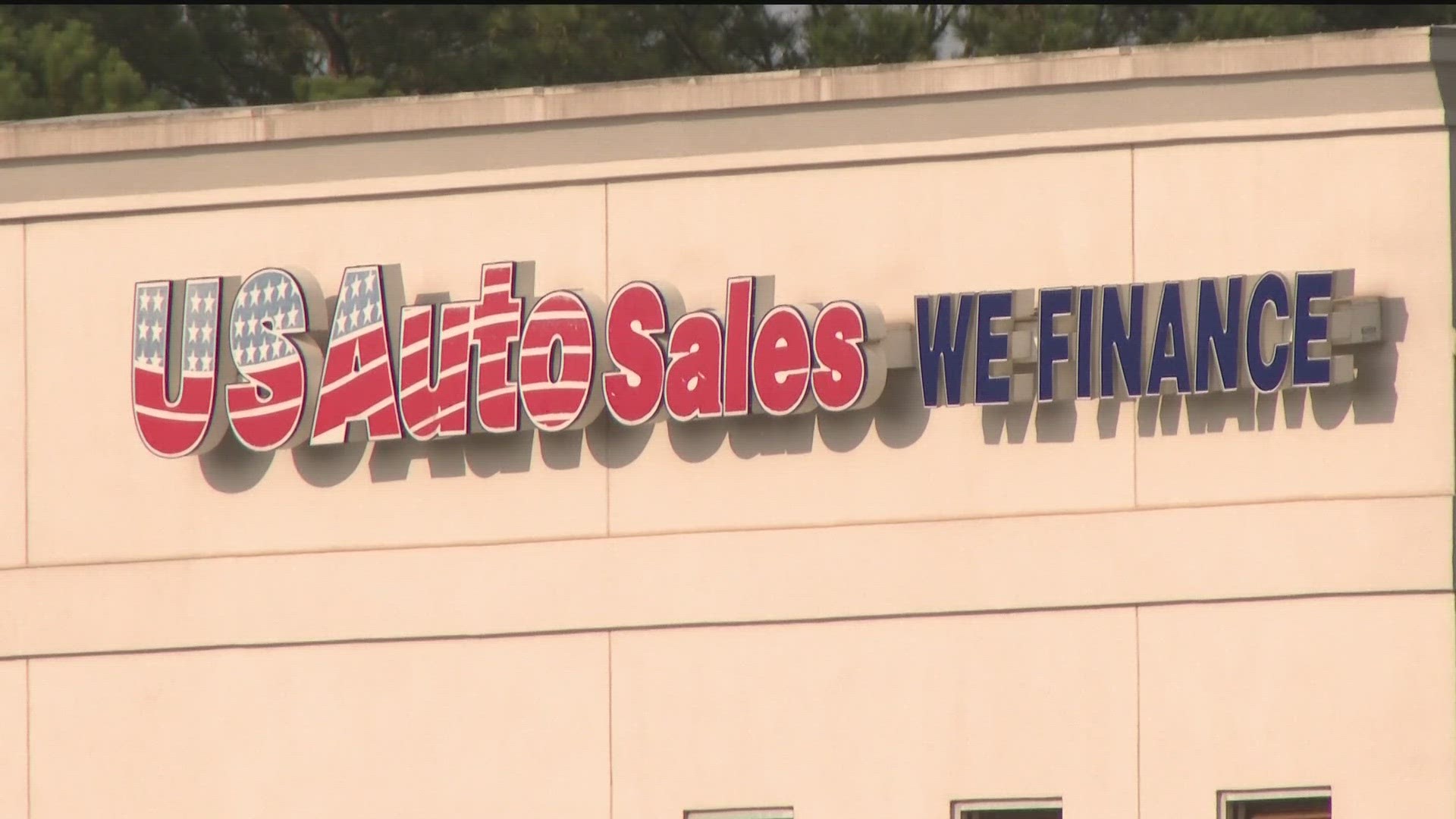LAWRENCEVILLE, Ga. — It's been four months since US Auto Sales abruptly sent employees home before shuttering more than 30 dealerships in the Southeast, including in Georgia.
Earlier this month, the Consumer Financial Protection Bureau (CFPB) filed a lawsuit in federal court against auto-loan servicer US Auto Sales Financing Services (USASF) for a number of alleged illegal practices.
USASF provided in-house financing through US Auto Sales which was a 'buy here, pay here' car dealership.
CFPB claims USASF wrongfully disabled borrowers’ vehicles, improperly repossessed vehicles, double-billed borrowers for insurance premiums, and failed to return millions of dollars in refunds to consumers.
“The CFPB is suing USASF for a range of misconduct, including illegally activating devices that prevented borrowers from starting their cars,” said CFPB Director Rohit Chopra. “Given the rising cost of cars during the pandemic and jump in auto loan debt across the country, the CFPB is working to root out illegal activity in this market.”
In a news release, CFPB alleges that USAF did the following:
- Illegally disabled cars: Many auto lenders require that cars are installed with devices using GPS technology that allow the lender or servicer to prevent a borrower from starting a car. These devices are known as “kill switches” or “starter interrupters.”
USASF incorrectly disabled vehicles at least 7,500 times and caused these devices to play warning tones in vehicles over 71,000 times during periods when the consumer was not in default or was in communication with USASF about upcoming payments. USASF remotely disabled vehicles at least 1,500 times after explicitly promising consumers it would not do so. - Failed to refund premiums to consumers: USASF offered consumers Guaranteed Asset Protection, which covers some of the difference (or gap) between the amount a borrower owes on their auto loan and what the car insurance will pay if the vehicle is stolen, damaged, or totaled.
When consumers paid off their loans early or USASF repossessed a car and charged off an account, consumers were entitled to refunds of any Guaranteed Asset Protection premiums paid in advance for periods where they would no longer have coverage. USASF failed to obtain millions of dollars in refunds from the Guaranteed Asset Protection administrator. - Double-billed consumers and misapplied payments: When consumers were enrolled in collateral-protection coverage by a USASF affiliate, they were also charged for that same coverage by USASF. Approximately 34,000 consumers were double-charged for the insurance each billing cycle, in some cases for over a year, costing consumers millions of dollars.
USASF also wrongfully applied consumers’ extra loan payments first to late fees or collateral-protection insurance instead of accrued interest. This misapplication of payments caused consumers to pay over a million dollars in interest and fees that they would not have paid if USASF had correctly applied their payments. - Wrongfully repossessed vehicles: USASF illegally repossessed the vehicles of some consumers who never qualified for repossession or had taken action to stop the repossession. In some instances USASF sold the vehicles that it had wrongfully repossessed.
You can read the federal lawsuit in its entirety here.
As for any compensation for consumers, when 11Alive reached out to CFPB, they sent a statement saying the federal lawsuit is part of the process to see if the company is liable. Their full statement is at the bottom of the story.
The bureau added that people can submit complaints here or by calling (855) 411-2372 8 a.m. to 8 p.m. ET, Monday through Friday.
11Alive reached out to US Auto Sales for comment but have not heard back as of Thursday night. Since the closure of the Lawrenceville-based company, Westlake Portfolio Management out of Los Angeles, California is now the servicer of U.S. Auto Sales' portfolio.
Consumer Financial Protection Bureau full statement
“The Bureau filed a lawsuit in federal court seeking an injunction to stop the alleged unlawful conduct; redress for affected consumers; the imposition of a civil money penalty; and other relief. The filing of a lawsuit is not a finding or ruling that the defendants have violated the law, and no injunction, redress, civil money penalty, or other relief has been ordered. If the defendants are found liable, the amount of any restitution will be determined in the litigation in federal court."

